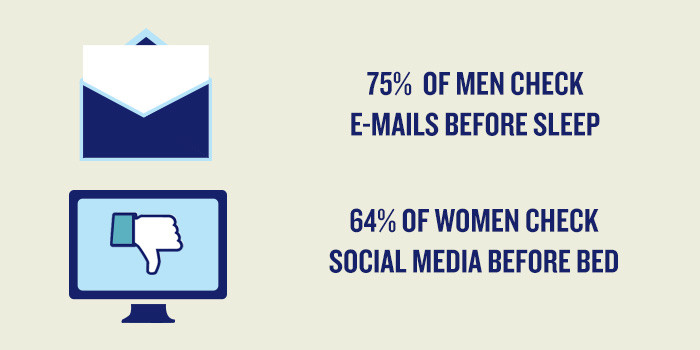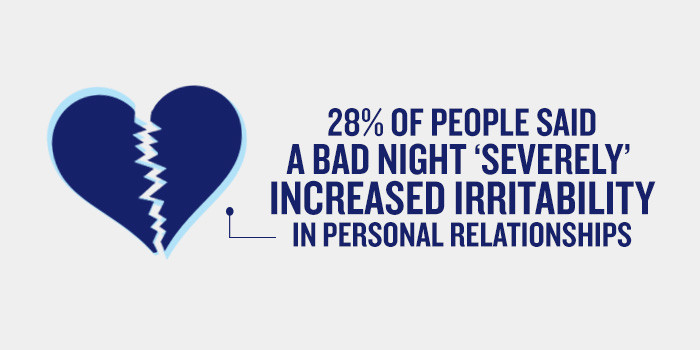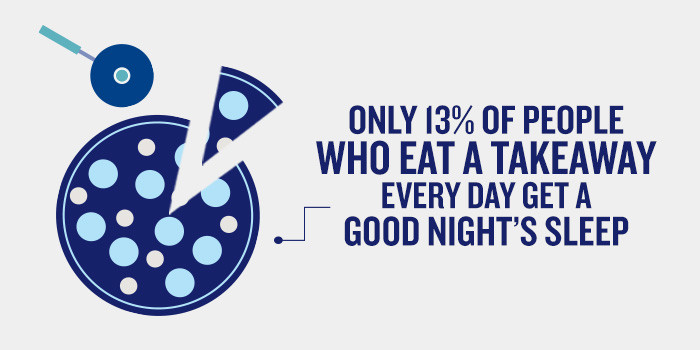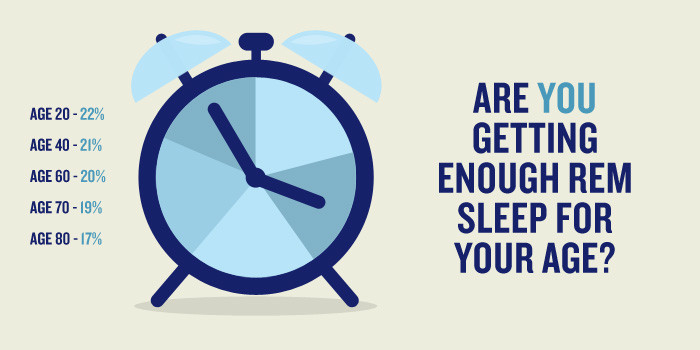HOW SLEEP DEPRIVATION AFFECTS HEALTH
Just like food and water, sleep is one of the basic human needs we simply cannot function without. Sleep deprivation, whether through lack of sleep, inadequate sleep quality or sleep disruptions, may have serious consequences that affect our personal and work life, and our mental and physical health.
What is sleep deprivation exactly? In general terms, sleep deprivation is used to describe a state caused by an inadequate quantity or quality of sleep. It can be a result of not getting enough sleep, sleeping at the wrong time of day, not sleeping well or not getting the different types of sleep your body needs, or having a sleep disorder.
Symptoms of sleep deprivation can include constant yawning, the tendency to doze off when not active for a while, grogginess when waking in the morning, grogginess throughout the day, or poor concentration and mood changes. However, the effect of sleep deprivation can be much more serious.
Sleep deprivation effects can include sleepiness and fatigue, which may make us more irritable or easily frustrated, or more likely to make mistakes or bad decisions. Sleep deprivation can even lead to road accidents and work injuries, with just 24 hours without sleep resulting in reduced hand-eye coordination equivalent to having a blood alcohol content of 0.1*.
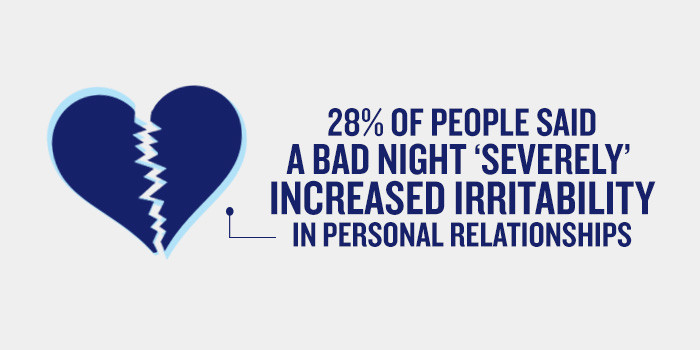
COMMON CAUSES OF SLEEP DEPRIVATION
Sleep deprivation can be caused by any number of factors. These can include:
- Personal choice, where people don’t understand the importance of sleep and choose to sleep less than they should.
- Poor sleep hygiene, where habits such as drinking caffeine or alcohol, or eating heavy meals or sugary snacks before bed prevents good quality sleep.
- Illnesses such as colds, sinus issues and tonsillitis causing snoring, gagging and frequent waking, resulting in fragmented sleep.
- Sleep disorders such as sleep apnoea and snoring disturbing the quality of sleep.
- Medications, such as those used to treat epilepsy or attention deficit hyperactivity disorder (ADHD) causing insomnia.
- Sleep environment disrupting sleep, where noisy neighbours, a snoring sleep partner, or temperatures that are too hot or cold result in poor sleep.
- Work can cause problems with sleep for those who work shifts or those who travel for work.
- Babies and children can wake in the night looking for feeding or comfort, resulting in sleep disruptions for their parents or carers.
HOW DOES SLEEP DEPRIVATION AFFECT WORK?
According to TEMPUR’s ‘The Science of Sleep’**, sleep deprivation can disturb the work we do to such an extent that it affects our country’s economy. Looking at data gathered from respondents throughout the UK, France, Germany, Japan and Australia, the survey indicated just how important sleep is to each country’s workers.
The UK in particular has experienced low productivity since the financial crisis in 2008, producing on average around 30% less than the Germans, French and the Americans per hour. Taking into account the fact that the UK finished bottom in almost every category of TEMPUR’s sleep study, that poor productivity could indeed relate to the poor quality sleep Britons are receiving.
The study showed that British workers were the only group surveyed to admit to being ‘often’ tired at work, with around 8% of Brits missing one or more days of work due to tiredness. Not only that, 46% reported that poor sleep ‘severely’ or ‘very severely’ impacts their ability to focus at work, versus 10% of all other nationalities surveyed.
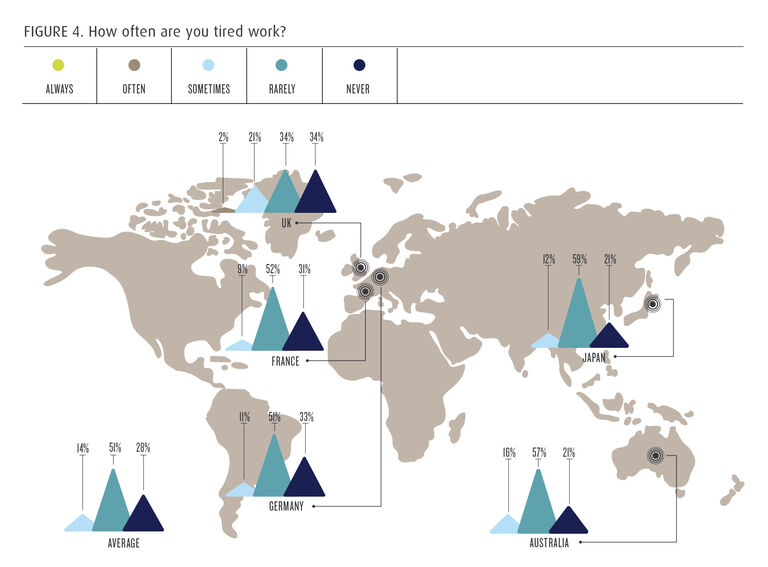
HOW DOES SLEEP DEPRIVATION AFFECT MENTAL HEALTH?
With past research indicating that depriving rats entirely of sleep results in death or a near-death state after 11-32 days, it’s clear to see just how important sleep is to us as functioning beings.
In terms of mental health, we know that sleep deprivation adversely affects the brain and cognitive function, as well as memory***. Lack of sleep may also result in mental disorder or mental illnesses, such a depression, stress and anxiety. Some may also point to sleep deprivation as a factor behind nervous breakdown or mental breakdown, and other serious mental health issues.
HOW DOES SLEEP DEPRIVATION AFFECT PHYSICAL HEALTH?
Sleep deprivation doesn’t just affect mental health, it also affects physical health. Apart from being more accident prone and clumsy, those who experience restricted sleep may not be able to process glucose as efficiently as those who enjoy eight hours’ sleep, giving them an increased likelihood of developing Type 2 Diabetes ***.
Sleep deprivation has also been shown to affect weight ****, where those who are sleep deprived experience an influx of the hunger hormone ghrelin, which sends signals to the brain to seek out quick-fix energy foods, such as sugary carbohydrates.
As for the effects of physical activity on the quality of sleep, it seems gym enthusiasts sleep better than those who refuse to exercise, with TEMPUR research showing that nearly 70% of those surveyed who exercise three times a week experience very good sleep compared to only 13.8% who exercise less than once a week.
Want to find out more about the benefits of sleep and how sleep can affect your mental and physical health? Check out our other blog posts for all the essential info on sleep here.
*
Better Health – Victoria Government:
https://www.betterhealth.vic.gov.au/health/conditionsandtreatments/sleep-deprivation
**
The Science of Sleep by Tempur:
https://www.raconteur.net/healthcare/understanding-the-sleep-economy
***
Sleep Association:
https://www.sleepassociation.org/sleep/sleep-deprivation/
****
The Science of Sleep by Tempur:
https://www.raconteur.net/healthcare/wellbeing-through-sleep
Feel it for yourself
Find a Tempur store or Stockist and try out our range of mattresses for yourself

